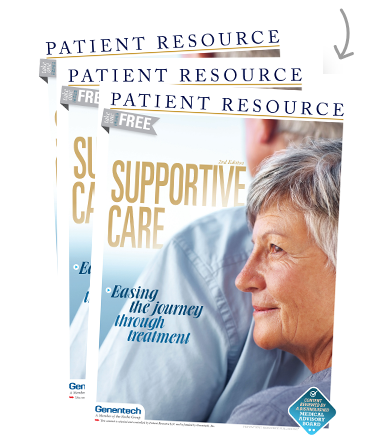Survivorship
From diagnosis through survivorship, you will have a valuable role in side effect management. For the most part, you have control over how you choose to live your life. Making smart lifestyle choices will position you to better tolerate treatment and its effects as you also continue to actively manage and control any underlying health conditions, such as high blood pressure and diabetes.
Many cancer treatments can affect your nutrition. Some can even cause malnutrition because your appetite, taste, smell and ability to eat or absorb nutrients from food may be affected. Your body needs essential nutrients, including fruits, vegetables, carbohydrates, fats and proteins, to recover.
Healthy eating during and after your treatment may help reduce the risk of cancer recurrence or secondary cancers. It also assists you with improving other health conditions, such as obesity, heart disease and diabetes, which have been linked to cancer. Maintaining a healthy weight is important, especially if treatment caused you to lose or gain weight.
A registered dietitian can offer nutritional counseling. If your health care team doesn’t include a dietitian, ask for a referral.
Being physically active is an important lifestyle choice for people with cancer. Before starting an exercise program, consult your health care provider about the exercises, intensity levels and duration of activities that are best for you.
Don’t be concerned that you will only get the benefits of exercise if you run a marathon. Even a 10-minute daily walk can energize you and reduce stress, fatigue, depression and anxiety. And, it’s a natural way to boost your mood, offering drug-free relief for many of the emotional side effects of cancer.
Rethink your daily habits. If you use tobacco, ask your health care team for resources to help you stop. Don’t drink excessive amounts of alcohol. Get adequate sleep. Pay attention to your mental health.
Stay up-to-date with vaccinations. Talk to your health care provider about the vaccinations, including influenza, COVID-19, shingles, pneumonia and others, that are appropriate for you. Do not receive any vaccination without talking to your health care provider first. Keep COVID-19 test kits on hand, and occasionally check their expiration dates.
Reclaim your sexual health
A cancer diagnosis and its treatment can change many aspects of your sexual health. You may face post-treatment sexual difficulties, such as a decreased sex drive, the inability to achieve or maintain arousal, pain during intercourse, the delay or absence of orgasm or feeling less desirable. Talking about these types of changes with a member of your health care team is crucial and you should not be embarrassed to bring them up. Your sexual health is a vital part of life. Don’t be surprised if your provider actually has a sexologist on staff as part of the treatment team. You won’t know, though, unless you ask.
Lastly, share your concerns with your partner and allow your partner to do the same. Do your best to set aside one-on-one time to rediscover and strengthen the intimacy in your relationship. Explore ways to be intimate other than intercourse. Depending on your situation, consider a discussion with a professional counselor or therapist.
Involve your health care team
Report a new side effect or symptom as soon as it happens, and share detailed information, such as when it began, how long it lasted and whether anything made it better. Early medical attention can help manage or even prevent side effects in the future. Be sure to tell your health care provider how you feel physically, mentally and emotionally, and include the following:
- New or ongoing physical symptoms, including pain, bladder/bowel control; deep fatigue or insomnia; sexual dysfunction or lack of desire; mobility issues; signs of infection; tingling or numbness; fluid buildup; or changes in appetite, sense of taste, vision or hearing
- Cognitive (thinking-related) dysfunction symptoms
- Depression, anxiety, fear, anger, grief, hopelessness, emotional numbness, feeling overwhelmed or other concerns
- New medications, over-the-counter remedies, vitamins, supplements or herbs
- Any visits to the emergency room, urgent care or other health care provider, even if not cancer-related
Recognizing late effects

Late effects may show up months or years after treatment. As with side effects, late effects result from certain types of cancer treatment, and your reaction to them can differ greatly from that of another person’s, even when you have the same diagnosis and treatment.
Some are determined by the particular drug and how the body reacts to it. Late effects from surgery and radiation therapy typically involve only the areas of the body that were treated.
Some late effects disappear over time, while others may be permanent. Some can even develop without warning years later. Because they can be so hard to predict, being aware of them is a good course of action.
Most late effects can be treated more easily and with a better outcome if they’re detected early. That’s why it’s so important to stick to the appointment schedule recommended in your survivorship care plan.
Following are common challenges that may occur. If you experience any of these, contact a member of your health care team:
- Balance issues
- Fatigue
- Limited range of motion
- Lymphedema
- Memory or other cognitive difficulties
- Mobility challenges
- Pain
- Problems chewing food
- Sexual health issues
- Swallowing difficulty
- Weakness



